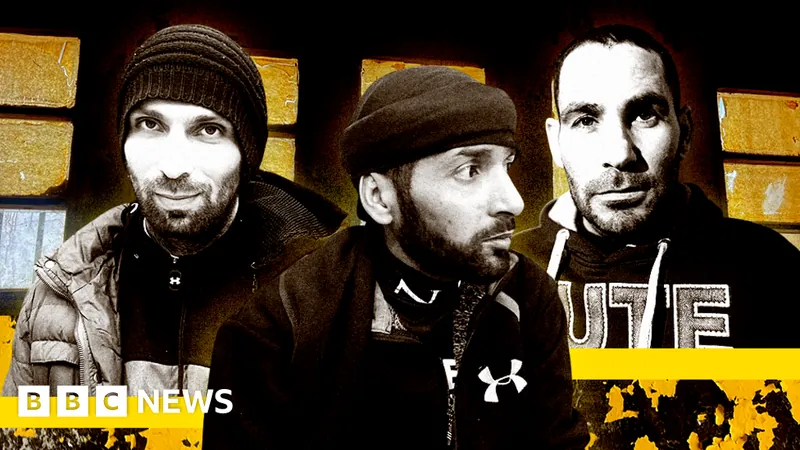
Inside the Horror: Ex-Prisoners of Saydnaya Torture Camp Share Their Stories
2024-12-14
Author: Jia
An Unimaginable Escape: The Liberation of Saydnaya Prisoners
In a shocking turn of events that marked a significant moment in the Syrian conflict, rebels successfully freed inmates from Saydnaya Prison, notorious for its brutal torture techniques. Just a week after their harrowing escape, four men recount the jubilation of their release and the terrifying years they endured behind bars.
*Warning: This article contains graphic descriptions of torture.*
As the prisoners sat in their dark and cramped cells, a sudden commotion erupted outside. A voice emerged, calling: "Is there anyone in there?" Fear gripped them. After years of association with beatings and sexual abuse whenever the door opened, they hesitated to respond. But that day was different. The rebels had arrived.
At the rallying cry of "Allahu Akbar," the men peeped through a small opening in their heavy metal door and were overwhelmed to see members of the Free Syrian Army instead of their oppressors. "We are here! Free us!" shouted Qasem Sobhi Al-Qabalani, a 30-year-old inmate, who described how he sprinted away, barefoot and terrified, fearing he might be recaptured.
Unbeknownst to them, President Bashar al-Assad had fled the country, leading to the collapse of his regime. The news of liberation swirled around through whispers as the freed inmates celebrated what Adnan Ahmed Ghnem, 31, called "the best day of my life—a feeling like someone who escaped death."
Among the survivors, these four men recounted chilling accounts of torture, witnessing horrific executions, and enduring systemic abuses that Amnesty International has condemned. Their testimonies depict Saydnaya as a "human slaughterhouse."
The prison, established in the 1980s, became a dungeon for political dissenters, notorious for its impenetrable walls and extensive barbed-wire fencing. Following the 2011 uprising, it turned into what many described as a "death camp." Inmates were incarcerated not only for opposition to Assad's regime but also for mere suspicion of dissent, transforming lives into endless suffering.
Forced confessions under extreme torture were commonplace. Qasem recounted his arrest at a checkpoint in 2016, falsely accused of terrorism linked to the Free Syrian Army. He painted a haunting picture of his initial days in Saydnaya, stripped of clothing, beaten for even glancing at the camera, and subjected to nightmarish isolation.
Conditions inside Saydnaya were horrific. The men recalled being shackled in small cells with no access to sunlight, food, or basic hygiene for days on end. Their former prison guide, who suffered injuries including amputated fingers from beatings, described the suffocating silence and fear over potential random executions.
"Every night, we thanked God for still being alive, praying to be released from this hell," Adnan recounted, speaking of nights filled with despair. The guards wielded an array of torture instruments, administering violent punishments for the slightest infractions or perceived disrespect.
Imad Jamal, 43, shared a glimpse into the psychological torment faced by inmates. "No eat. No sleep. Hit. Cane. Everything not normal," he recounted with a grimace. His ordeal included breaking his back under a guard’s weight, merely for seeking to assist a fellow inmate suffering from illness.
Throughout their time, the men were robbed of all dignity. They witnessed brutal sexual assaults and found themselves performing degrading acts out of desperation for sustenance. Their stories showcased the depth of corruption, with families forced to bribe officials for food and basic necessities that seldom reached their loved ones.
The fear of death loomed large, as every night, inmates awaited the dreaded roll call when names were called—signalling the fate of those who would never return. Qasem's family paid substantial bribes, hoping to delay his execution, yet freedom remained elusive until the rebel assault.
Finally liberated, the men faced daunting realities. Adnan and Qasem feared that each night’s sleep could lead back to that torturous existence; the nightmare felt never-ending. As they embraced their newfound freedom, they found their families, and celebratory gunfire resonated in the air, symbolizing both survival and loss.
"My heart feels like it's been reborn," Qasem exclaimed, overwhelmed by emotion as he reflected on his escape. "It's not just freedom from the prison, but freedom from fear, pain, and the haunting memories of Saydnaya."
These survivors carry the weight of unimaginable trauma, but their stories shine a light on the dire need for justice and acknowledgment of the suffering endured within the walls of that infamous prison. Human rights organizations continue to demand accountability, hoping to prevent such atrocities from ever occurring again in Syria or elsewhere.


 Brasil (PT)
Brasil (PT)
 Canada (EN)
Canada (EN)
 Chile (ES)
Chile (ES)
 España (ES)
España (ES)
 France (FR)
France (FR)
 Hong Kong (EN)
Hong Kong (EN)
 Italia (IT)
Italia (IT)
 日本 (JA)
日本 (JA)
 Magyarország (HU)
Magyarország (HU)
 Norge (NO)
Norge (NO)
 Polska (PL)
Polska (PL)
 Schweiz (DE)
Schweiz (DE)
 Singapore (EN)
Singapore (EN)
 Sverige (SV)
Sverige (SV)
 Suomi (FI)
Suomi (FI)
 Türkiye (TR)
Türkiye (TR)